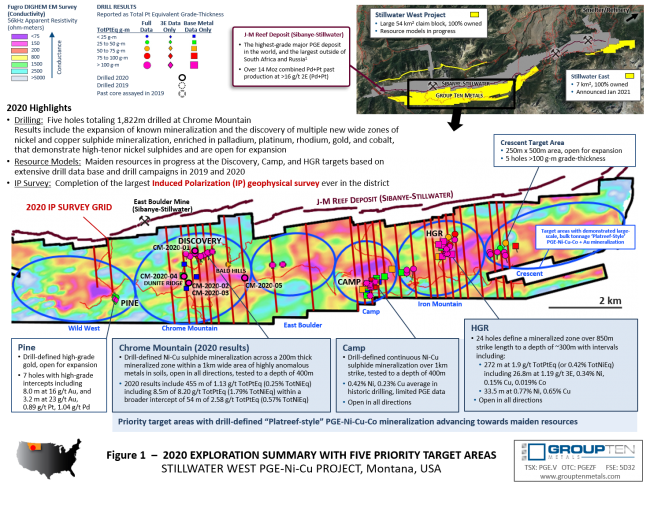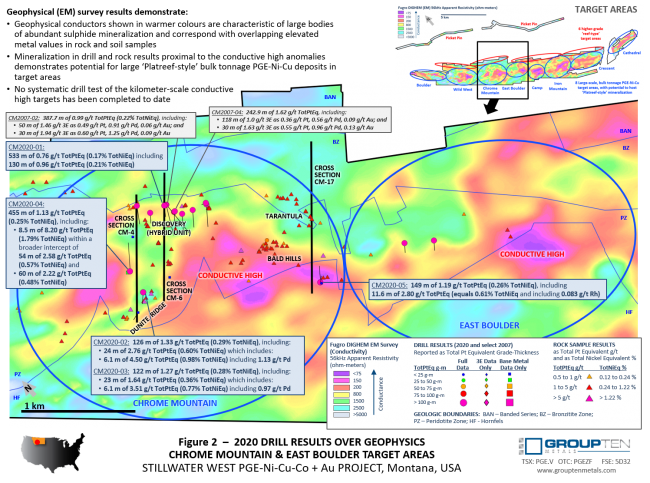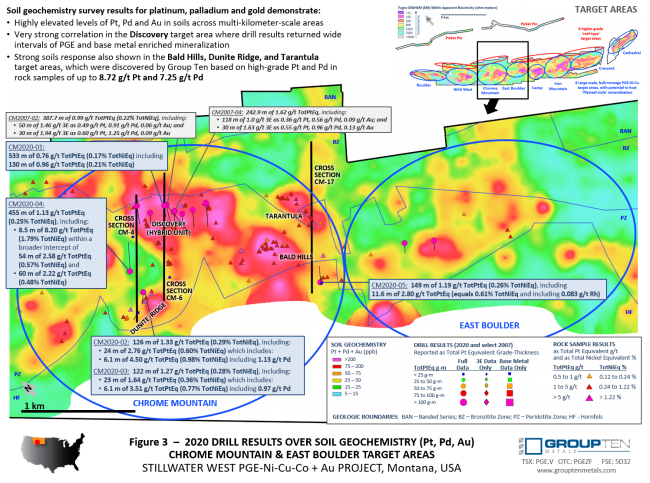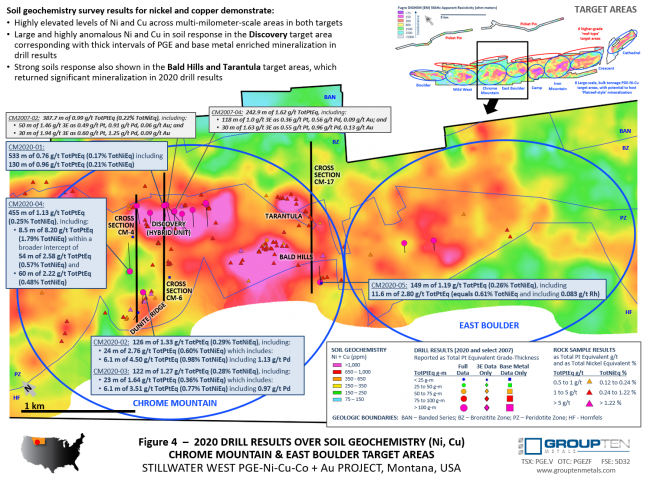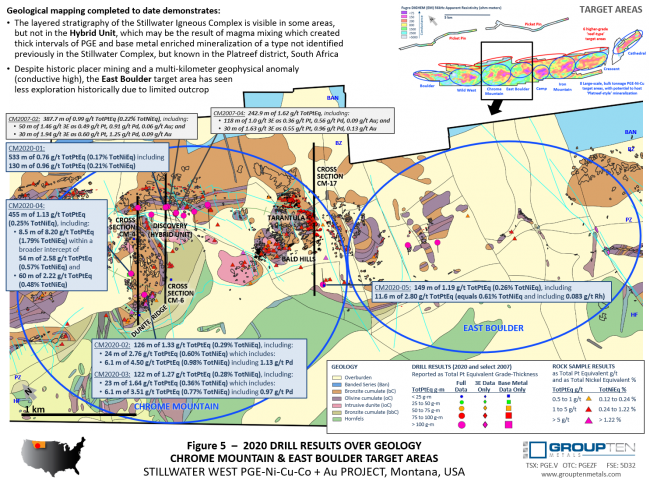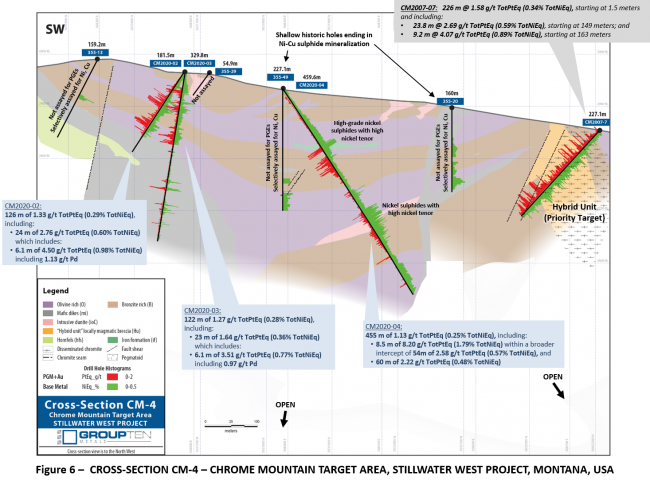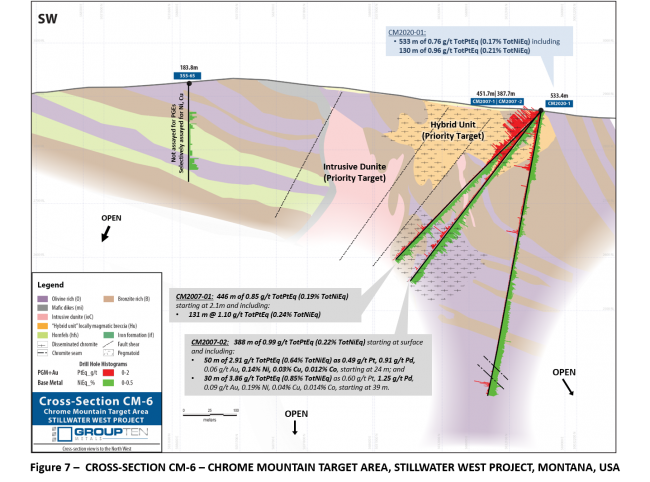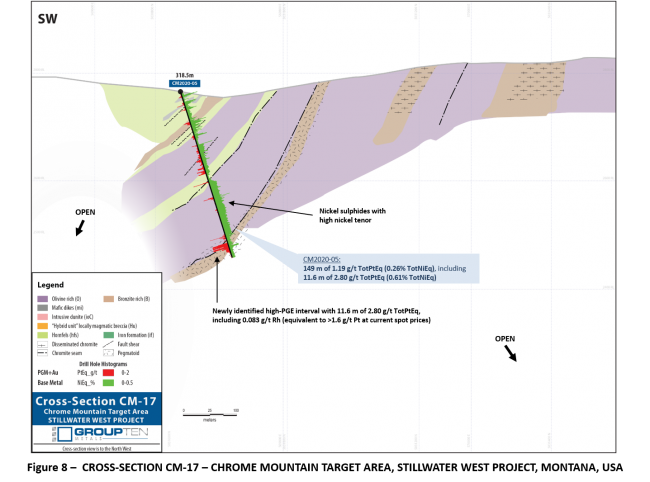Related Document
March 3, 2021 – Vancouver, BC - Group Ten Metals Inc. (TSX.V: PGE; US OTC: PGEZF; FSE: 5D32) (the “Company” or “Group Ten”) is pleased to announce results from the 2020 drill campaign at the Chrome Mountain target area of the Company’s flagship Stillwater West Platinum Group Element (“PGE”)-Ni-Cu-Co + Au project in Montana, USA.
Intervals from 120 to 530 meters of continuous nickel and copper sulphide mineralization, enriched in palladium, platinum, rhodium, gold, and cobalt, were intercepted in the five drill holes starting at or near surface, with each hole also encountering higher-grade intervals over widths of 50 to 150 meters in addition to more selective high-grade intervals. These results further demonstrate the potential for multiple, large-scale, bulk tonnage “Platreef-style” horizons of battery metals and PGEs within the lower Stillwater complex, based on known parallels with South Africa’s Bushveld complex.
Work in 2020 included a five-hole, 1,822-meter (5,979 foot) drill campaign which focused on the Chrome Mountain target area, in follow-up to the previous campaigns which focused on the HGR and Camp target areas. The Company’s drilling to date has had the primary objectives of driving the conversion of drill-defined mineralized zones towards formal mineral resources while also expanding areas of known mineralization at priority target areas. 2020 Chrome Mountain drill results are now being incorporated into 3D block models to progress the generation of formal mineral resources in parallel to the work underway at the HGR and Camp target areas, with an expected release of maiden resources for all three target areas by mid-2021.
2020 Drill Highlights:
- CM2020-04 returned strong mineralization across its entire length with 455 meters of 1.13 g/t Total Platinum Equivalent (“TotPtEq”), or 0.25% Total Nickel Equivalent (“TotNiEq”), starting at surface with multiple well-mineralized intervals that include two horizons of previously unidentified nickel sulphide mineralization of 8.5 meters of 8.20 g/t TotPtEq (or 1.79% TotNiEq) within a broader intercept of 54 meters of 2.58 g/t TotPtEq (0.57% TotNiEq) and, separately, 60 meters of 2.22 g/t TotPtEq (0.48% TotNiEq).
- CM2020-05 returned strong nickel and PGE mineralization in multiple intercepts within 149 meters of 1.19 g/t TotPtEq (0.26% TotNiEq), including 11.6 meters of 2.80 g/t TotPtEq.
- CM2020-02 returned 126 meters of 1.33 g/t TotPtEq (0.29% TotNiEq) with multiple PGE-rich intervals including 24 meters of 2.76 g/t TotPtEq (0.60% TotNiEq), 6.1 meters of 4.50 g/t TotPtEq (0.98% TotNiEq), and 15 meters of 2.61 g/t TotPtEq (0.57% TotNiEq).
- CM2020-03 returned 122 meters of 1.27 g/t TotPtEq (0.28% TotNiEq) including 6.1 meters of 3.51 g/t TotPtEq (0.77% TotNiEq).
- CM2020-01 returned 533 meters of 0.76 g/t TotPtEq (0.17% TotNiEq) for a total of 405 gram-meter TotPtEq grade-thickness, starting at surface and including 130 meters of 0.96 g/t TotPtEq (0.21% TotNiEq).
- Preliminary metallurgical assessments returned strong nickel tenor in sulphides in drill holes from the 2020 campaign. Historic initial bench-scale metallurgical results completed by AMAX in the 1970s at the Camp target area demonstrate the potential for effective nickel and copper sulphide flotation and PGE metal recovery. Sample collection for more detailed metallurgical testing is on-going.
- Rhodium was reported in all five drill holes at potential co-product levels with grades that are comparable to mines in South Africa. There is very little mine supply of rhodium outside of South Africa and Russia, and persistent multi-year supply deficits have priced rhodium at more than 20x the value of platinum.
CEO Comment
Michael Rowley, President and CEO, commented, “Our 2020 drill campaign exceeded our expectations, not only expanding drill-defined mineralization and driving the resource modeling effort at the priority Chrome Mountain target area, but also identifying multiple new well-mineralized horizons that feature wide intervals of battery metals, PGEs, and gold in previously untested areas. The high-grade nickel sulphide intercepts in hole CM2020-04 are particularly exciting as they represent very high nickel tenor horizons in a new discovery that is open for expansion. This was our first test of a fraction of the targets identified in our 77 line-kilometer 2020 IP geophysical survey, and the success of this program is a strong demonstration of its effectiveness in targeting new discoveries with both grade and scale. The results also speak to the extraordinary size and potential of the lower Stillwater complex, with impressive “Platreef-style” battery metal and PGE mineralization in each hole featuring intercepts that are hundreds of meters in width. The strategic importance of a U.S.-based large-scale battery metal asset like Stillwater West to contribute towards the growing needs of manufacturers like Tesla while also supplying PGEs to emerging fuel cell manufacturers in North America leverages the value of this critical resource. We look forward to further announcements including our plans for 2021, which we anticipate will include our largest exploration program to date, and the delivery of maiden resource estimates, currently targeted for summer 2021.”
TABLE 1 - Highlight Drill Intercepts from the 2020 Drill Campaign at Chrome Mountain
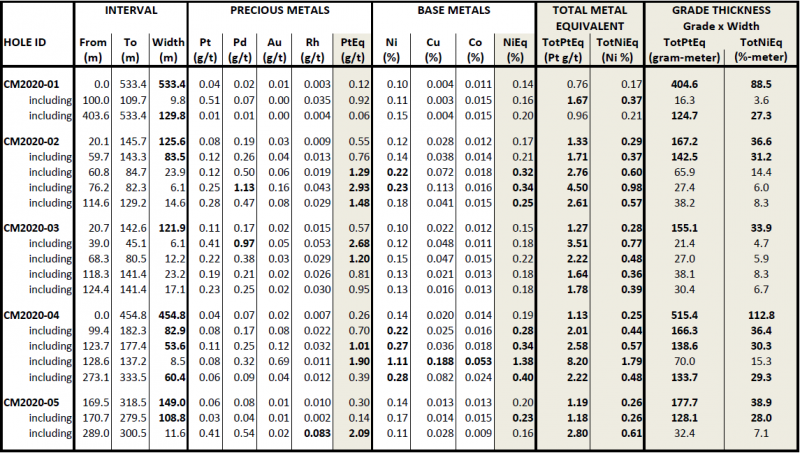
Highlight intercepts with grade-thickness values over 25 gram-meter TotPtEq are presented above. Total Platinum Equivalent (TotPtEq g/t) and Total Nickel Equivalent (TotNiEq %) calculations reflect total gross metal content using metals prices as follows (all USD): $6.00/lb nickel (Ni), $3.00/lb copper (Cu), $20.00/lb cobalt (Co), $900/oz platinum (Pt), $1,650/oz palladium (Pd), $1,500/oz gold (Au), and $7,000/oz rhodium (Rh). Values have not been adjusted to reflect metallurgical recoveries. Total metal equivalent values include both base and precious metals. Total platinum equivalent grade-thickness was determined by multiplying the thickness (in meters) by the Total Platinum Equivalent grade (in grams/tonne) to provide gram-meter values (gram-meter) as shown. Total nickel equivalent grade-thickness was determined by multiplying the thickness (in meters) by the Total Nickel Equivalent grade (in percent) to provide percent-meter values as shown. Grade-thickness values have been determined across continuously mineralized intervals. Nickel equivalent values may be converted to copper equivalent values by multiplying the NiEq value by the price ratio of the two (ie times two per the above prices), such that 0.5% NiEq equates to 1.0% CuEq. Platinum equivalent has been used based on the historic values of platinum and palladium. Platinum equivalent values may be converted to palladium equivalent values by multiplying the PtEq value by the price ratio of the two (ie times 0.55 per the above prices), such that 1 g/t PtEq equates to 0.55 g/t PdEq. Intervals are reported as drilled widths and are believed to be representative of true widths.
Upcoming Events
Company Webinar - Group Ten Metals is hosting a webinar on Thursday March 4th at 8am PST (11am EST) to discuss results from the 2020 drill campaign and emerging plans for 2021. For more information including registration, please click here.
PDAC 2021 - The Company will be presenting at the Prospectors & Developers Association of Canada International Convention on March 10, 2021 in a technical session focused on the global supply of battery and platinum group metals. More information is available here:
Discussion
Group Ten is targeting world-class deposits of PGEs, battery metals, and gold in the famously metal-rich and productive Stillwater mining district, where the Company is focused on the lower Stillwater complex based on known parallels with South Africa’s Platreef district. The mines of the Platreef, on the north limb of the Bushveld complex, are among the largest and most profitable in the world. Led by the development of Anglo American’s Mogalakwena mines in the 1990s, the district has grown to include Ivanhoe’s Platreef mine and Platinum Group Metals’ Waterberg project, and now hosts over 400 million ounces of PGEs and gold, and tens of billions of pounds of nickel and copper. The massive deposits of the Platreef are attractive because their scale and grade allow the application of mechanized bulk mining methods with resulting economies of scale and low operating costs. These deposits contain significant quantities of both battery grade nickel and platinum group metals in a combination that is globally very rare, and very attractive at current commodity prices.
Group Ten’s location adjacent to and stratigraphically below Sibanye-Stillwater’s J-M Reef deposit – the highest-grade PGE deposit in the world, and the largest outside of Africa and Russia – directly parallels the setting of mines on the Platreef, which are similarly located below the productive Merensky and UG2 Reefs in the layered stratigraphy of the Bushveld complex. The Company’s 61-square-kilometer land position, 100% owned by Group Ten, includes eight multi-kilometer-scale “Platreef-style” target areas in the lower Stillwater complex, and six target areas with more conventional “Reef-type” targets.
Resource modeling of Platreef-style mineralization is now in progress at the Chrome Mountain, Camp, and HGR target areas, driven by results from Group Ten’s 2020 and 2019 drill campaigns and more than 31,000 meters of total drill data across the project. As shown in Figure 1, drill data in these areas delineates thick intervals of continuous mineralization, starting at or near surface in most areas, and running from 1 to 1.5 kilometers in strike length at each of the target areas, and occurs within broader geophysical and geochemical (metal-in-soil) anomalies. Mineralization is open to expansion at all three targets with geophysical anomalies from ground-based IP and airborne EM indicating significant extension potential along trend and to depth. The Company is also advancing two other target areas with drill-defined mineralization, the Pine and Crescent target areas. The Pine target includes drill-defined high-grade gold and PGEs within a largely untested conductive high that reaches two kilometers to the west and is coincident with high-level metal-in-soil anomalies.
Group Ten’s 2020 drill campaign focused on the Discovery, Dunite Ridge, and Bald Hills targets in the Chrome Mountain area, in follow-up to the previous campaign which focused on the HGR and Camp target areas. Table 1 presents a summary of continuous mineralized intervals from 2020 drill results including their corresponding grade thickness values which are some of the highest intercepted to date in the Stillwater Complex. Grade-thickness values are used for comparing the strength of mineralization across different mineralized widths. A grade-thickness value of 25 gram-meter (equivalent to 1 g/t Pt over 25 meters, or 25 g/t Pt over 1 meter) or more is considered economically significant, with the adjacent J-M Reef mines averaging approximately 34 gram-meter Pd and Pt1,2. Values over 100 gram-meter are exceptional, highlighting the strength of the mineralized system.
Results expanded known mineralization at the advanced Discovery target area and identified multiple new mineralized horizons to the south and southeast of Discovery that are open for expansion in subsequent campaigns.
Hole CM2020-01 expanded Hybrid Unit mineralization in the developing resource model at the Discovery target while also targeting also deeper geophysical anomalies identified in the 2020 IP survey. Mineralization at the Hybrid Unit is now defined by eleven drill holes at the Discovery target that delineate a mineralized zone of a type not identified previously in the Stillwater Complex, but known at the Platreef (see December 17, 2018 and February 21, 2019 news releases). Mineralized over its entire 533-meter length, CM2020-01 returned an impressive 404.6 gram-meter TotPtEq total grade-thickness. High-grade platinum values are demonstrated over shorter intervals, with wide intervals such as 9.8 meters at 0.51 g/t Pt demonstrating size. The Pt:Pd ratio is platinum-rich in hole CM2020-01, which is unusual for the normally palladium-rich Stillwater complex. CM2020-01 also returned high-grade gold with 2.44 meters at 2.49 g/t Au starting at 6.1 meters.
Holes CM2020-02 and 03 targeted high-grade PGE mineralization seen in surface samples and supported by other work, while also targeting deeper geophysical anomalies identified in the 2020 IP survey. Both holes returned higher-grade mineralization across more than 120 meters starting near surface, while also returning PGE-rich intervals within previously unidentified nickel and copper sulphide horizons. Robust battery metal grades were also noted in shorter intervals in CM2020-02, including 4.1 meters of 0.81% NiEq (as 0.58% Ni, 0.17% Cu, and 0.042% Co), plus PGEs totaling 1.12 g/t PtEq, starting at 60.8 meters. Multiple intervals demonstrated attractive nickel tenor with >3.4% Ni in sulphides reported in preliminary work.
CM2020-04 was completed mid-way between Discovery and Dunite Ridge to test an undrilled portion of a large and continuous IP anomaly identified in the 2020 IP survey, as corroborated by coincident anomalies in earlier work. The hole is an offset of historic hole 355-49, drilled by AMAX in 1973, which was a 227-meter vertical hole that returned increasing nickel and copper results downhole with limited assay data. CM2020-04 returned impressive precious and base metal mineralization across its entire length, starting at surface and including two very compelling intervals of nickel-rich sulphides with important potential co-product grades of palladium, platinum, gold, rhodium, copper, and cobalt. High-grade gold, palladium, nickel, and cobalt were also reported over shorter intervals in CM2020-04.
With an impressive 515.4 gram-meter TotPtEq grade-thickness, CM2020-04 ranks as one of the best mineralized intercepts ever drilled in the Stillwater district, second to 517.7 gram-meter TotPtEq in hole IM2019-03, which was drilled over 7km to the west at the HGR target at Iron Mountain in Group Ten’s 2019 drill campaign.
CM2020-05, completed in the Bald Hills target area, targeted mineralization that was identified in the 2020 IP survey and corroborated with coincident anomalies in earlier work. The hole returned strong nickel and PGE mineralization in multiple intercepts that include the identification of a new PGE-rich horizon with rhodium values of 0.083 g/t over 11.6 meters that are comparable to mine grades in South Africa’s Platreef district and equivalent to >1.6 g/t Pt at current spot prices. This interval also returned a near-balanced Pt:Pd ratio with 0.41 g/t Pt and 0.54 g/t Pd, which is a departure from the normally palladium-rich values seen at Stillwater. High-grade battery metals were also noted in CM2020-05, and several intervals returned good nickel tenor of the sulphides, with values over 3% Ni in preliminary analysis.
About Stillwater West and East
The Stillwater West and East PGE-Ni-Cu-Co + Au projects position Group Ten as the second-largest landholder in the Stillwater Complex, adjoining and adjacent to Sibanye-Stillwater’s Stillwater, East Boulder, and Blitz PGE mines in south-central Montana, USA1. The Stillwater Complex is recognized as one of the top regions in the world for PGE-Ni-Cu-Co mineralization, alongside the Bushveld Complex and Great Dyke in southern Africa, which are similar layered intrusions. The J-M Reef, and other PGE-enriched sulphide horizons in the Stillwater Complex, share many similarities with the highly prolific Merensky and UG2 Reefs in the Bushveld Complex. At the same time, the lower part of the Stillwater Complex also shows the potential for much larger scale disseminated and high-sulphide PGE-Ni-Cu-Co deposits, similar to the Platreef in the Bushveld Complex3. Group Ten’s Stillwater projects cover the lower part of the Stillwater Complex along with the Picket Pin PGE Reef-type deposit in the upper portion and includes extensive historic data, including soil and rock geochemistry, geophysical surveys, geologic mapping, and historic drilling.
About Group Ten Metals Inc.
Group Ten Metals Inc. is a TSX-V-listed Canadian mineral exploration company focused on the development of high-quality platinum, palladium, nickel, copper, cobalt, and gold exploration assets in top North American mining jurisdictions. The Company’s core asset is the Stillwater West PGE-Ni-Cu-Co + Au project adjacent to Sibanye-Stillwater’s high-grade PGE mines in Montana, USA. Group Ten also holds the high-grade Black Lake-Drayton Gold project adjacent to Treasury Metals’ development-stage Goliath Gold Complex in northwest Ontario, and the Kluane PGE-Ni-Cu-Co project on trend with Nickel Creek Platinum‘s Wellgreen deposit in Canada‘s Yukon Territory.
About the Metallic Group of Companies
The Metallic Group is a collaboration of leading precious and base metals exploration companies, with a portfolio of large, brownfield assets in established mining districts adjacent to some of the industry’s highest-grade producers of silver and gold, platinum and palladium, and copper. Member companies include Metallic Minerals in the Yukon’s high-grade Keno Hill silver district and La Plata silver-gold-copper district of Colorado, Group Ten Metals in the Stillwater PGM-nickel-copper district of Montana, and Granite Creek Copper in the Yukon’s Minto copper district. The founders and team members of the Metallic Group include highly successful explorationists formerly with some of the industry’s leading explorers/developers and major producers. With this expertise, the companies are undertaking a systematic approach to exploration using new models and technologies to facilitate discoveries in these proven, but under-explored, mining districts. The Metallic Group is headquartered in Vancouver, BC, Canada, and its member companies are listed on the Toronto Venture, US OTC, and Frankfurt stock exchanges.
Note 1: References to adjoining properties are for illustrative purposes only and are not necessarily indicative of the exploration potential, extent, or nature of mineralization or potential future results of the Company’s projects.
Note 2: Based on Sibanye-Stillwater’s 2018 Mineral Resources and Mineral Reserves Report.
Note 3: Magmatic Ore Deposits in Layered Intrusions—Descriptive Model for Reef-Type PGE and Contact-Type Cu-Ni-PGE Deposits, Michael Zientek, USGS Open-File Report 2012–1010.
FOR FURTHER INFORMATION, PLEASE CONTACT:
Michael Rowley, President, CEO & Director
Email: info@grouptenmetals.com Phone: (604) 357 4790
Web: http://grouptenmetals.com Toll Free: (888) 432 0075
Quality Control and Quality Assurance
2020 drill core samples were analyzed by ACT Labs in Vancouver, B.C. Sample preparation: crush (< 7 kg) up to 80% passing 2 mm, riffle split (250 g) and pulverize (mild steel) to 95% passing 105 µm included cleaner sand. Gold, platinum, and palladium were analyzed by fire assay (1C-OES) with ICP finish. Rhodium was analyzed by fire assay (1C Rhodium). Selected major and trace elements were analyzed by peroxide fusion with 8-Peroxide ICP-OES finish to insure complete dissolution of resistate minerals.
Mr. Mike Ostenson, P.Geo., is the qualified person for the purposes of National Instrument 43-101, and he has reviewed and approved the technical disclosure contained in this news release.
Forward-Looking Statements
Forward Looking Statements: This news release includes certain statements that may be deemed “forward-looking statements”. All statements in this release, other than statements of historical facts including, without limitation, statements regarding potential mineralization, historic production, estimation of mineral resources, the realization of mineral resource estimates, interpretation of prior exploration and potential exploration results, the timing and success of exploration activities generally, the timing of the timing and results of future resource estimates, permitting time lines, metal prices and currency exchange rates, availability of capital, government regulation of exploration operations, environmental risks, reclamation, title future driling actiivities and the locations of such drilling, and future plans and objectives of the company are forward-looking statements that involve various risks and uncertainties. Although Group Ten believes the expectations expressed in such forward-looking statements are based on reasonable assumptions, such statements are not guarantees of future performance and actual results or developments may differ materially from those in the forward-looking statements. Forward-looking statements are based on a number of material factors and assumptions. Factors that could cause actual results to differ materially from those in forward-looking statements include failure to obtain necessary approvals, unsuccessful exploration results, changes in project parameters as plans continue to be refined, results of future resource estimates, future metal prices, availability of capital and financing on acceptable terms, general economic, market or business conditions, risks associated with regulatory changes, defects in title, availability of personnel, materials and equipment on a timely basis, accidents or equipment breakdowns, uninsured risks, delays in receiving government approvals, unanticipated environmental impacts on operations and costs to remedy same, and other exploration or other risks detailed herein and from time to time in the filings made by the companies with securities regulators. Readers are cautioned that mineral resources that are not mineral reserves do not have demonstrated economic viability. Mineral exploration and development of mines is an inherently risky business. Accordingly, the actual events may differ materially from those projected in the forward-looking statements. For more information on Group Ten and the risks and challenges of their businesses, investors should review their annual filings that are available at www.sedar.com.
Neither the TSX Venture Exchange nor its Regulation Services Provider (as that term is defined in the policies of the TSX Venture Exchange) accepts responsibility for the adequacy or accuracy of this release.

